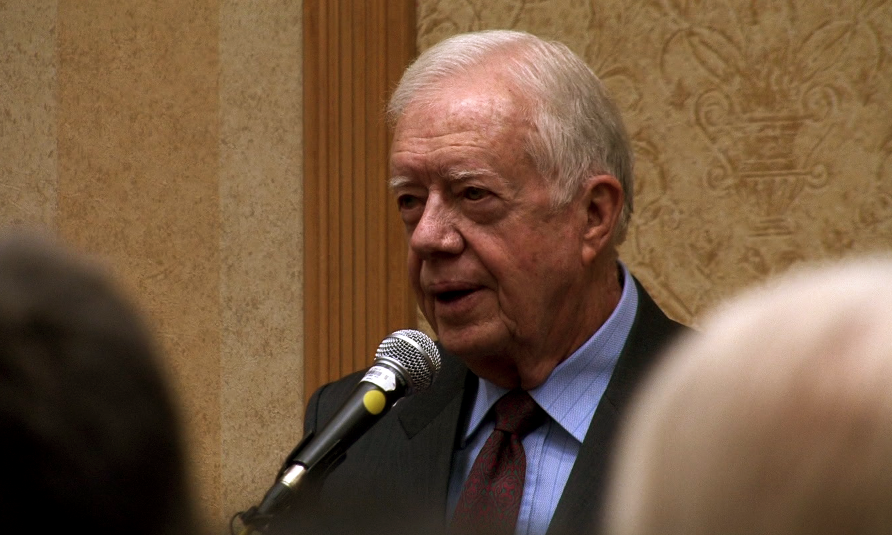
BTR News: Jimmy Carter’s Legacy of Palestinian Human Rights Advocacy
By Scotty Reid – The passing of former President Jimmy Carter at the age of 100 has sparked reflections on his life of service and moral leadership. Among Carter’s many humanitarian efforts, his steadfast advocacy for the rights of Palestinians stands out as both courageous and controversial. In a political climate where denouncing Israeli government policies can invite fierce backlash, Carter spoke with unusual candor for a U.S. president—before, during, and long after his time in office.
Yet, as the White House under President Joe Biden hails Carter’s humanitarian achievements, a stark irony emerges: the same administration offers robust economic, diplomatic, and military support to an Israeli government accused by leading human rights organizations—such as Amnesty International, Human Rights Watch, and B’Tselem—of systemic persecution of Palestinians, war crimes, and even apartheid. This tension between honoring Carter’s legacy while enabling Israel’s continued subjugation of Palestinians encapsulates a deep contradiction in U.S. foreign policy.
Carter’s Outspoken Critique of Israeli Policies
Jimmy Carter’s most notable foray into the Israeli-Palestinian conflict came with his 2006 book, Palestine: Peace Not Apartheid. In it, Carter explicitly likened aspects of Israel’s treatment of Palestinians to the policies once instituted by apartheid-era South Africa. The book triggered immediate uproar in mainstream U.S. media and political circles. Nevertheless, Carter insisted that without openly confronting the issues—such as settlements in the occupied territories, severe travel restrictions on Palestinians, and their economic deprivation—no lasting or equitable solution could be found.
Carter did not limit his critiques to Israel alone; he also questioned the role of the American Israel Public Affairs Committee (AIPAC). He argued that the strong lobbying power of AIPAC and other pro-Israel groups significantly skewed U.S. foreign policy, discouraging constructive dialogue and perpetuating a status quo harmful to both Palestinians and Israelis.
Biden’s Contrasting Approach
President Joe Biden, in stark contrast, once proudly declared himself a Zionist in a public statement, emphasizing his unwavering support for Israel. This stance has been reflected in policy decisions: since taking office, the Biden administration has continued to provide significant military and economic aid to Israel and has been reluctant to criticize Israeli governmental actions that human rights observers have condemned as war crimes or crimes against humanity.
- Military Aid: The United States allocates billions of dollars annually to Israel’s defense budget. These funds have been used to advance and maintain the Israeli military apparatus, including its blockade of Gaza and control over the West Bank—both widely seen as major factors contributing to Palestinians’ dire humanitarian situation.
- Diplomatic Shield: Beyond financial support, the U.S. often employs its veto power in the UN Security Council to block resolutions critical of Israel, effectively insulating it from international rebuke over alleged human rights abuses.
These policies stand in direct opposition to Carter’s warnings that American leaders must confront the moral and geopolitical costs of enabling Israeli expansion into Palestinian territories. Biden’s homage to Carter as a humanitarian hero thus appears at odds with his administration’s ongoing defense of Israel’s most contentious policies, including its settlement expansions and military offensives.
The Labeling of Israeli Actions as “Genocide” or “Apartheid”
Recent reports by major human rights organizations have described Israel’s treatment of Palestinians in terms of “apartheid.” Some activists and legal scholars go further, using the term “genocide” to characterize the systematic nature of displacement, siege, and violence faced by Palestinian communities. While official U.S. policy does not endorse these designations, the weight of international opinion—particularly from human rights groups—continues to point in that direction, adding urgency to Carter’s earlier warnings.
The Israeli government and its defenders dispute these labels, arguing that Israel’s actions are defensive measures against terrorism. Critics counter that the scale and regularity of Israel’s military campaigns, along with its decades-long occupation, more closely resemble collective punishment than targeted security operations.
Carter’s Vision vs. Biden’s Policy
Jimmy Carter was not naïve; he understood that peace and justice in the Middle East would require difficult compromises on all sides. However, his willingness to address inequities in Israel’s policies and the disproportionate toll on Palestinian civilians set him apart from most U.S. presidents, past and present. Carter’s approach essentially said: If the United States truly wants to be a mediator, it must confront the power imbalances and acknowledge Palestinian grievances.
Biden’s policies, grounded in long-standing political commitments to Israel, reflect a near-unchanged Washington consensus that rarely questions Israeli strategy. Whether supporting an Israeli administration accused of apartheid or providing cover for its military operations, these actions pose a glaring departure from Carter’s legacy of identifying and condemning human rights abuses wherever they arise—even among U.S. allies.
Conclusion: The Irony of Praising Carter While Ignoring His Message
To many observers, the deepest irony in the Biden administration’s praise for Carter’s humanitarianism is that it ignores the core of Carter’s message on Israel-Palestine: genuine peace can only be achieved through an equitable solution that respects Palestinian human rights. Carter risked his reputation to lay bare the influence of pro-Israel lobbying groups on U.S. politics, challenging citizens and policymakers alike to engage in an honest debate.
By eulogizing Carter as a champion of global justice while perpetuating—and in many ways intensifying—uncritical support for Israel, the current White House highlights the very contradictions Carter fought to expose. If Jimmy Carter’s legacy has taught us anything, it is that moral courage sometimes means rejecting longstanding biases and instead centering the voices of the oppressed—no matter how politically costly that may be.
Author’s Note:
Jimmy Carter leaves behind an indelible mark as one of the few American leaders who spoke unequivocally about Palestinian rights. As the world remembers him for his humanitarian projects and diplomatic efforts, it is essential not to overlook the specific part of his legacy that dared to confront one of the most entrenched double standards in U.S. foreign policy. The question remains: Will America heed Carter’s counsel, or will his legacy be another cautionary tale lost to political inertia?